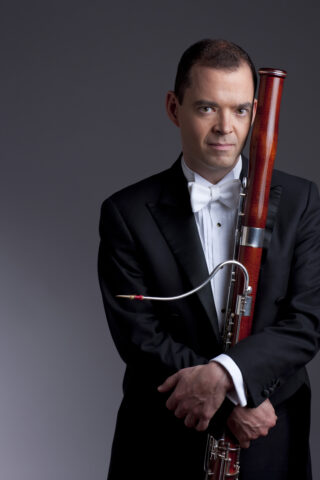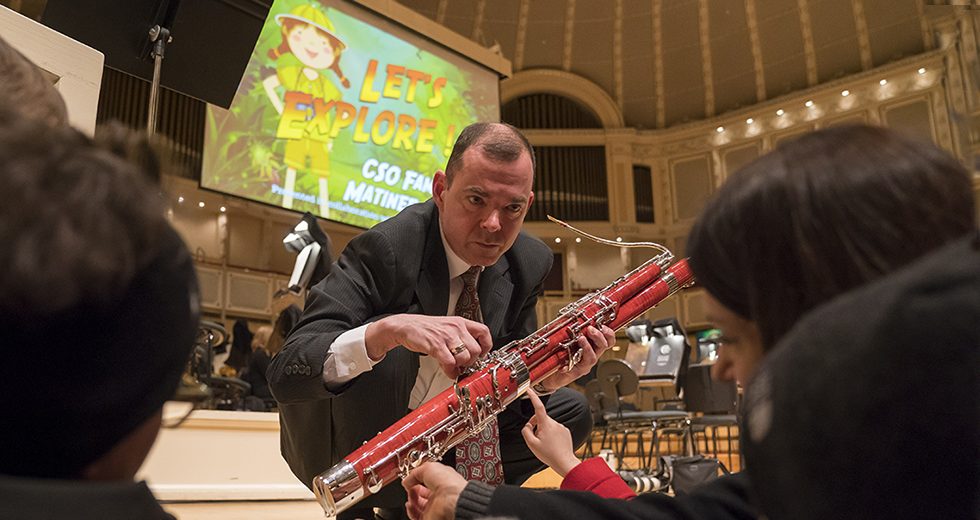Bill Buchman is an example of the career success and longevity possible in classical music, and that there are many paths one can take to get there. Bill has worked as an orchestral bassoonist for 30 years, first with the Dallas Symphony and now as Assistant Principal Bassoon of the Chicago Symphony Orchestra. Like many orchestra musicians, Buchman was exposed to music from an early age, taking piano, clarinet, and bassoon lessons, singing in school and church choirs, and playing in numerous school ensembles. But when he applied to colleges as a high school senior, he applied for physics, not for music.

CMPI Faculty Member and Assistant Principal Bassoon of the Chicago Symphony Orchestra William Buchman | Photo by Todd Rosenberg
“My sister and I are very close in age, and in high school she was already oriented toward a music career. I wanted to do my own thing and had always enjoyed math and science. I was taking physics, so it was in the front of my mind while applying for college,” Buchman recalled. “Once I was in college, I saw other students who had a clear aptitude for physics that I did not. At the same time, I had an easy understanding of music that most others lacked. An orchestra conductor suggested I apply for grad school in music performance, and I was admitted at four of the five schools I applied to. Two years after I started grad school, I won my first full-time job.”
Like many great musicians, Buchman came to teaching out of a desire to give back. “I had benefited so much from the guidance of my own teachers that I felt a duty to pay it forward,” he said. “I started teaching regularly at the college level in 1998, when both DePaul and Roosevelt University offered me a part-time position.” Since that time, Buchman has honed the craft. “I had no training as a pedagogue, so I was very much learning how to teach on the fly,” he recalled. “I continue to try to improve as a teacher, especially by watching others teach.” Buchman went on to say that he considers “the amount of talking done in a lesson or master class to see how quickly they can get results, using a minimum of words. I’m always curious whether the topics they address are ones I would also focus on, or if instead they’re hearing things that I’m ignoring. It helps me fine-tune my own listening skills.”
While most of Bill Buchman’s teaching experience is at the college level, he recognizes that to create equity in orchestras, resources must be directed to younger students. “I’ve insisted, for decades, that the path towards addressing the problem of under-represented groups in classical music has to start in elementary and high school. The Chicago Symphony Orchestra has sought diversity among its ranks for many years, but a look at the mostly homogeneous membership of the CSO’s training orchestra will show that the pipeline is not effective enough in opening doors for minority players. I strongly believe that programs like CMPI, sustained over years and decades, is the best way to change that, and I’m so happy to be a part of that.”
Through CMPI, Buchman is preparing a senior bassoonist for college auditions. “The process of college admissions is daunting for any high school senior, and while some applicants have advantages of resources and family background, it will be harder for those lacking them to compete effectively for admission to the best programs. It’s important to take full advantage of any opportunity to get a leg up, but it’s also important to make the most of what you have. CMPI can provide not only higher quality instruments, but also access to superior and more in-depth instruction than most public schools make available. CMPI also creates a supportive environment where young musicians can surround themselves with others who share their passion. It’s just the right environment for inspiration and ambition to flourish,” Buchman stated.
When asked what words he’d like to share with CMPI students, Buchman said, “We’ve been greatly challenged by the restrictions that the COVID pandemic has imposed upon us this past year, but the time soon will come when we can return to the company of our friends and colleagues, and when we do, we’ll remember what a joy it is to make music with others and to share in the artistry of centuries of musicians who came before us. We’re part of a great lineage, and we have it within us to carry it forward for ourselves and for future generations.”
TOP: CSO Assistant Principal Bassoon William Buchman interacts with young patrons after a CSO School and Family Concert. | Photo by Todd Rosenberg 2018
